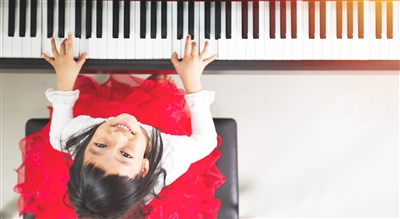How long does it take to reach grade one on the piano?

How much time will it take a new music student to reach grade one on the piano? This is a question very often asked by new students coming to the instrument. The truth may be that this first grade is the most difficult of all. By the time a student has attained grade seven they will be in possession of a wealth of techniques and abilities, and their musicianship will be such that reaching grade eight will be a relatively easy task.
A new student coming to the piano has an enormous amount of work to do before they are ready to tackle the grade one exam. Assuming they have not played any other keyboard instrument, they will have to learn their way around the keys - no easy task when their eyes will be be straining to decipher sheet music for much of the time.
Many people are under the impression that passing grades for an instrument merely entails learning three or four pieces. The truth is far more multifaceted - certainly pieces must be learnt (three in fact, chosen by the pupil from a selection), but they must also learn sets of scales, arpeggios, and will be required to undertake sight-reading and aural tests.
The question still stands though: how long will it take to reach grade one on the piano? Many teachers would say around a year, but it really depends on how much effort the student is willing to put in. Most students starting out on the piano will be having weekly lessons of between half an hour and an hour. The key factor determining their progress will be how much work they are put in between these lessons. If they don`t do any practice the seeds of knowledge planted during their lessons will receive no nourishment, their abilities will not grow, and their teacher will be compelled to repeat the work of the previous week.
The student who is able to practice every day will make the greatest progress. Many teachers recommend no less than 20 minutes work a day. To an adult this might not sound like very much, but to a child 20 minutes stuck at a piano, away from their toys and screens, can be an arduous task, and they will likely require the assistance of an adult to keep them focussed.
Of course practice time must be used efficiently. The student must focus on the areas they are weakest in, striving to overcome that which they find most difficult. As with all forms of study, it can be tempting to spend time on parts you are already comfortable in, rather than facing that which you find most problematic. Students must make sure they practice in an effective way, working through those passages they have not yet mastered. Their teacher will have identified these problematic areas, and each lesson should be an evaluation of the work the student has put in during the week.
Their teacher will very likely suggest which fingering should be used in certain difficult passages, perhaps writing on the sheet music the finger number (one being for the thumb, two the index finger, and so on) that will make the piece easier to perform. Of course piano playing is not all about the mastery of a few pieces, and a good teacher will want to develop their students` sight reading, aural skills, and scales. The grade one exam will test them in all these areas, so the student must be well prepared.
In order to make sure the student is using their time most effectively, and covering all areas that will come up in their exam, the teacher might want to create a study plan. The Trinity Exam Handbook is a very useful resource, allowing the student to tick off practice time assigned to a range of activities, such as scales, arpeggios, and sight reading tasks.
An extremely helpful way to learn pieces is through listening to someone else performing them, and students will benefit greatly by following the performance on their music score as they hear it played. It is likely they will be able to locate a performance of their piece on youtube, or download the track from a commercial website for a modest sum. If the music cannot be found online they could ask their teacher to perform it, making a recording on their phone, which could be sent to the student`s parents.
As daunting as it may be, students should attempt to perform their pieces to friends and members of their family. Playing the piano in front of people, especially strangers, will help them build confidence, and feel a sense of pride in their growing abilities. During their exam they will of course have to play in from of strangers, so they must try to overcome any apprehensions they may have about playing in front of an audience.
Learning the piano is certainly challenging, but it is a wonderful instrument, and competency on a keyboard will open many doorways to you. Whereas the guitar is largely confined to the genre of rock, and the trumpet most often finds its solo expression in jazz, the piano has the ability to be useful in myriad musical domains. Its ability to create large and complex structures means it can effectively recreate orchestral scores through effective transcriptions; while it`s bel canto `singing facility` enables it to express the most tender and moving lyrical music. No one will ever regret having put time into learning to play the piano.

 Add a Comment
Add a Comment